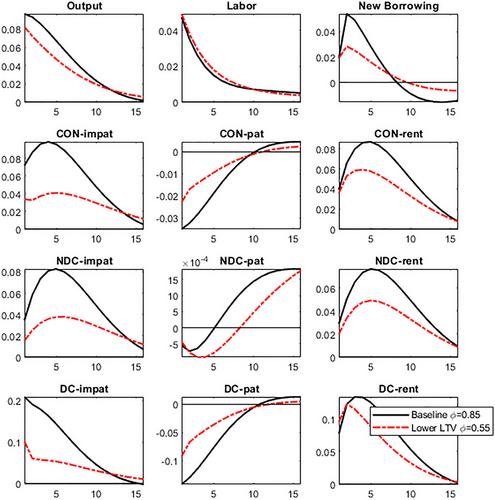家庭债务和财政政策的影响
IF 1.3
3区 经济学
Q2 ECONOMICS
引用次数: 0
摘要
我们研究了政府支出冲击的影响如何取决于家庭的资产负债表状况。利用美国的家庭调查数据,我们发现在政府支出的正向冲击下,有抵押贷款债务的家庭会有较大的正向消费反应,租房者的反应较小,而无房户的反应不明显。我们考虑了一个包含三类家庭的模型,结果表明该模型可以成功解释这些发现。流动性限制和财富效应在冲击传播中起着至关重要的作用。我们的研究结果表明了家庭抵押贷款债务状况在财政政策传导机制中的重要性。本文章由计算机程序翻译,如有差异,请以英文原文为准。

HOUSEHOLD DEBT AND THE EFFECTS OF FISCAL POLICY
We examine how the effects of government spending shocks depend on the balance sheet position of households. Employing U.S. household survey data, we find a large, positive consumption response for households with mortgage debt, smaller response for renters, and an insignificant response for outright homeowners, in response to a positive government spending shock. We consider a model with three types of households and show that it can successfully account for these findings. Liquidity constraints and wealth effects play a crucial role in shock propagation. Our findings suggest the importance of household mortgage debt position in the transmission mechanism of fiscal policy.
求助全文
通过发布文献求助,成功后即可免费获取论文全文。
去求助
来源期刊

International Economic Review
ECONOMICS-
CiteScore
2.60
自引率
0.00%
发文量
0
期刊介绍:
The International Economic Review was established in 1960 to provide a forum for modern quantitative economics. From its inception, the journal has tried to stimulate economic research around the world by publishing cutting edge papers in many areas of economics, including econometrics, economic theory, macro, and applied economics.
 求助内容:
求助内容: 应助结果提醒方式:
应助结果提醒方式:


